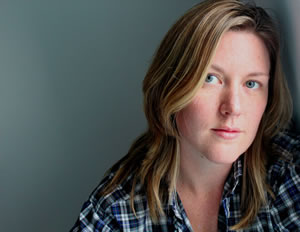|
All writers seem to have a particular cocktail of needs that must be met before they can focus. Some, gallingly, only seem to need oxygen and a pen. Others have elaborate, precious rituals, like fashioning a spear from a narwhal tusk and driving it through the wireless router. Or the necessary cocktail might be made out of gin and vermouth. Personally, I like to have coffee and headphones, and I need alone time.
I don't mean I seal myself in a cave. This past winter, I spent three months in Paris on an artist residency, and while my studio offered ample solitude and charmingly bleak Cold War decor, I did most of my writing at Starbucks. I know, I know. I should have been perched on a rickety chair in the back of a tiny café, drinking espresso out of a thimble that once belonged to Gertrude Stein. But at Starbucks, you can sit for an eternity with your laptop and your headphones, and drink a giant latte, and no one will bother you. That soothing cocoon of corporate blandness lured me to work every day. I didn't have to worry about my bad French and scary waiters and the intersection thereof; they have electrical outlets; there are many Starbucks in Paris, allowing for variety (yet predictability) in venue. Endlessly repeated sameness served my purpose: I could feel of-the-world at the same time I was putting on my headphones and ignoring it. I didn't have to feel guilty about missing a cultural experience.
For me, aloneness has less to do with hermetic remoteness than with a drastic reduction in day-to-day social interactions. If the language part of my brain stays switched over to writing mode and doesn't flip back and forth to jabbering/engaging/emoting mode, I have an easier time focusing. I learned this by accident. Four years ago, when I was writing the first draft of my novel, I lived on Nantucket from October through May, the months when the island hibernates under a thick gray blanket of clouds. I didn't know anyone, but I assumed I would make friends. This, in retrospect, was silly. Dropped into a new location, I become a furtive, shadow-seeking creature—not a brazen individual who joins kickball leagues or hangs out in bars or strikes up conversations with the people she sees every day when she walks her dog. No. At one point, I went five weeks without having a face-to-face conversation beyond, say, thanking the cashier at the Stop & Shop. Low-grade, amorphous anxiety dogged me. I obsessed over small tasks, like taking my trash to the dump. I switched to decaf. If I could do it over again, I would, at the very least, take my computer to the library or the coffee shop every day, but I was a novice and instead went slowly insane.
My time on Nantucket was hard. But it was also beautiful and strange. Time changed shape. When every day is the same, you look harder at each one, hoping for some new detail. I noticed wind direction, patterns of erosion, flower buds. I wrote four hundred pages. And, in the most liberating evolutionary turn of my life, I became self-contained. Once I was content to be alone, I was unencumbered, utterly portable, free. Now I travel alone. I seek out opportunities to retreat from my life, to deprive myself of the comforts and laziness of home, to shock my senses with newness, to achieve a silence that is something different and deeper than a lack of sound. I want the inside of my head to be the bottom of a well, and then I want the blankness and heaviness to go away and leave me in the zero-gravity place where I can get some work done. Hours pass unnoticed; Parisian teenagers furiously make out in the Starbucks armchair next to mine.
I worry about getting too entrenched in aloneness, too dependent on isolation as my pathway to productivity. I don't want to exile myself from human connection. The goal and hope of artist retreats is to offer sanctuary and the possibility of true focus, but focus isn't external. It's more elusive than place or routine. Altering the circumstances of the body can trigger new focus in the mind, but I also believe that all our secluded cabins and predawn scribblings and shamanistic banishings of the internet are beside the point. They are tricks we play on ourselves, superstitions that might help us finish the next story or book but will eventually fail us. It would be terrible to think you couldn't find your way back to focus just because one of many paths is blocked. Maybe the best thing is not to trust any one means of finding focus but only to trust the state itself. I hope I can learn how to extricate my focus from my solitude, to domesticate my silence.
|


